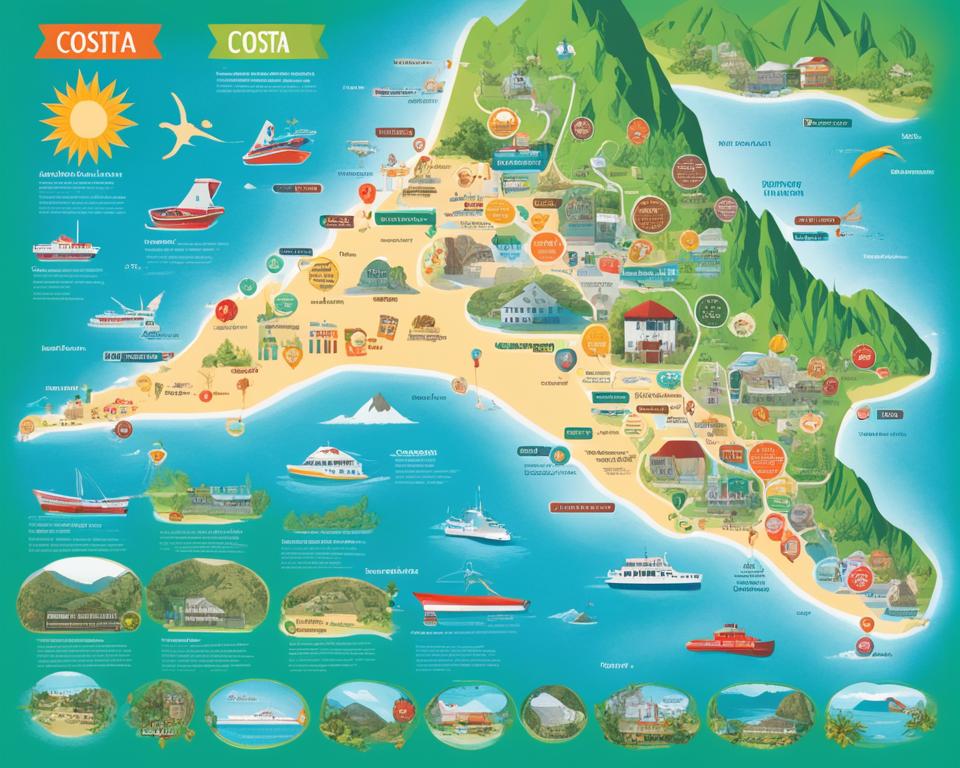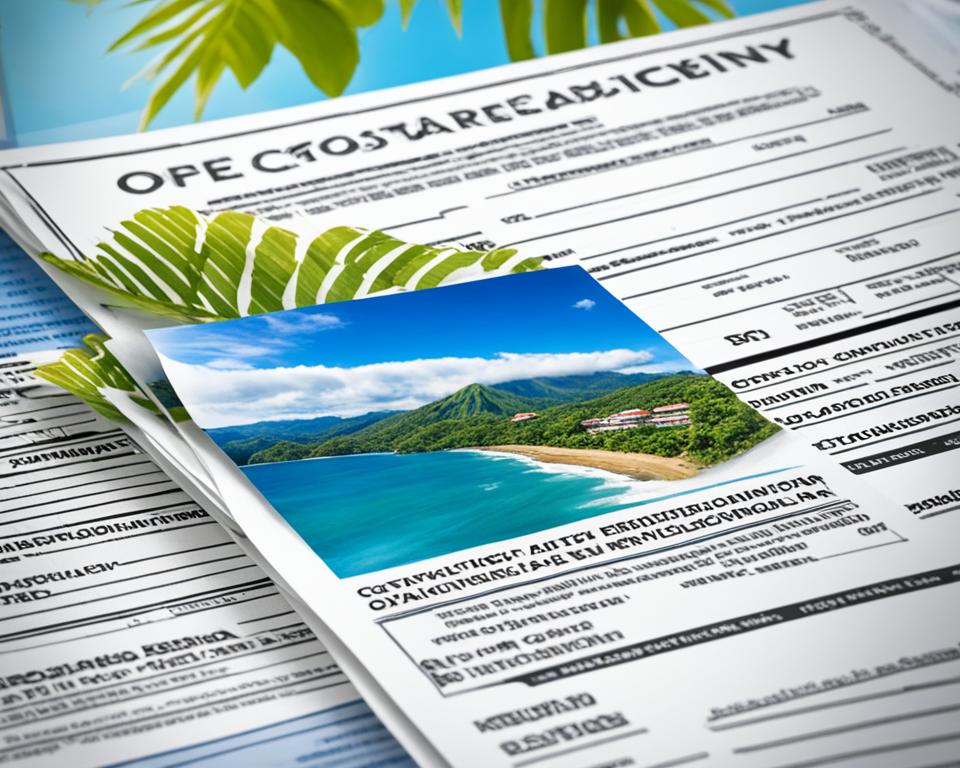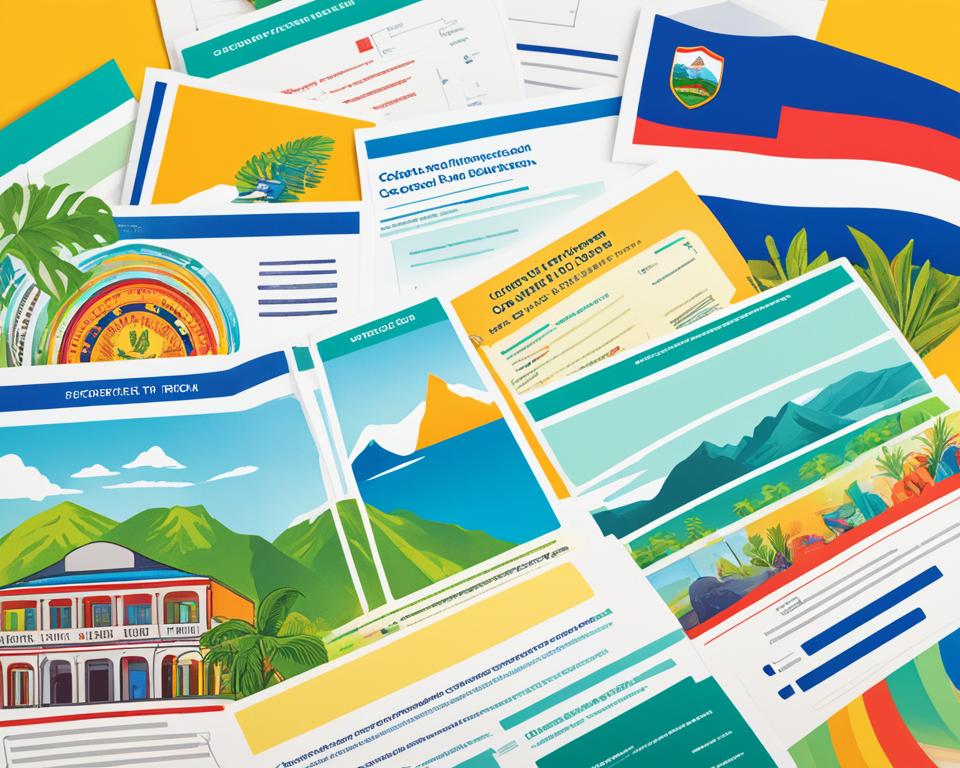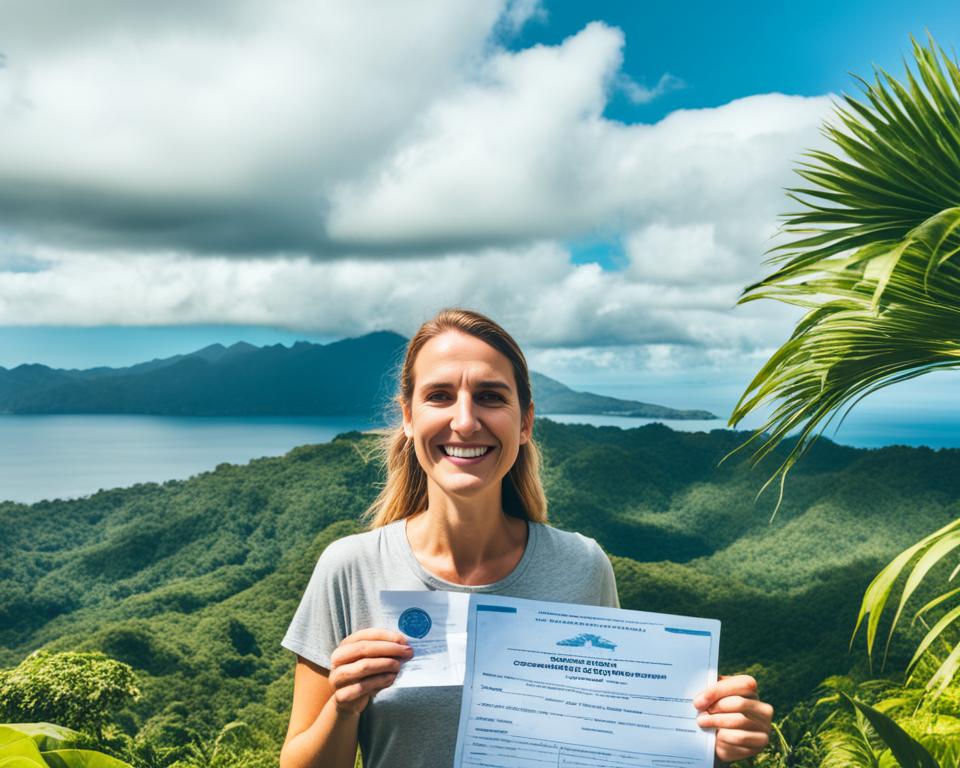As a hub for international workers and service providers, Costa Rica has introduced Law No…

Costa Rica Residency Application Process: The Complete Guide With CRIE.cr
Costa Rica’s calm settings and tropical beauty draw people looking to get away. The path to residency might look full of forms and steps. But with the right advice, getting that warm welcome is not far off.
Key Takeaways
- U.S. citizens must prepare several documents for Costa Rica residency. These include a letter of application, recent photos, fingerprint proof, birth certificates with apostilles, and police records.
- Signing up with the U.S. Embassy via the Smart Traveler Enrollment Program (STEP) is vital. It helps you get important updates on safety in Costa Rica for Americans.
- There are different fees to consider for applying for residency in Costa Rica. This includes document checks, authentications, and government fees that must be included in your plans.
- The time it takes to process your residency in Costa Rica can change. It depends on your residency type and how complete your application is. Make sure your visa stays valid during the process.
- Using legal help for authenticating your documents and translating them into Spanish adds extra costs. Keep this in mind when budgeting for your residency in Costa Rica.
Understanding the Basics of Costa Rica Residency
Costa Rica is famous for its stunning natural beauty and lively culture. It attracts many who want a change in life, like expats and retirees. If you’re thinking about living here permanently, or just for a while, it’s important to know the key facts. This knowledge will help you move through the residency process smoothly.
Types of Costa Rican Residency: Permanent and Temporary
There are both permanent and temporary residency options in Costa Rica. Each serves different needs and situations. For those who have family in Costa Rica or have lived with a temporary visa for three years, permanent residency might be an option. Temporary residency suits others, like retirees, academics, and investors.
Documentation and Legal Prerequisites
To get a Costa Rican residency permit, you need to be very careful and follow all rules. You’ll need various documents, like your birth certificate and police records. These documents are very important for your visa application.
The Role of Costa Rica Immigration Experts (CRIE)
The Costa Rica Immigration Experts (CRIE) understand how hard the application process can be. They are great help for anyone wanting to live in Costa Rica. They know a lot about residency permits and can help you through the whole process. With their help, getting a Costa Rica residency becomes much easier.

Navigating Costa Rica’s Residency Requirements
Starting your residency in Costa Rica means following certain rules set by the government. This includes filling out the residency application form, getting consular registration, and showing you have enough money. Covering these steps is key to meeting the residency criteria.
Essential Application Steps
The first steps to apply for residency in Costa Rica are to complete all required forms and get registered with the consulate. You also need to show you’re financially stable. It’s important to know the details for the type of residency you’re applying for, like permanent or temporary residency.
Apostilles and Document Legalization
To apply for residency in Costa Rica, your U.S. documents must have an Apostille. This process verifies your documents are real, which is required. Making sure you have this for documents like birth certificates is important in the application.
Smart Traveler Enrollment Program (STEP)
Enrolling in the Smart Traveler Enrollment Program (STEP) is advised for Americans wanting to live in Costa Rica. It keeps you updated on safety issues, making your move safer and smoother.
Registration with the Embassy
It’s also helpful to register with the U.S. Embassy in Costa Rica when you’re making the move. This can aid in getting help and important info from the Embassy, especially in tough situations.

Temporary Residency Options and Their Specifics
Costa Rica has special programs for people wanting to live there temporarily. These programs help retirees, scholars, and professionals. They let people come and enjoy the country’s culture and beauty. At the same time, they can work on getting a costa rica temporary residency, costa rica residency for investors, or a costa rican retirement residency.
The Costa Rica Retirement Residency is for those wanting a quiet and joyful retirement in Costa Rica. To join, retirees need to show they have enough money and meet other rules.
There’s also a program for rentistas, or independent investors. It’s for people who have a fixed income from investments. This lets them live in Costa Rica and do business there.
For people working or learning, there’s help too. Digital nomads and remote workers can find a place here. They can work from Costa Rica, enjoy its beauty, and keep up with friends worldwide.
Figuring out how to get costa rican residency might seem hard. But, with experts’ help, it becomes easier. Knowing about these programs helps people make smart choices. It’s the first step to a great life in Costa Rica.

Costa Rica Residency Application Process
The Costa Rica residency application process is demanding. The Immigration Office carefully looks at every submission. To start the application, hopeful permanent residents must hand in their forms and documents. They send these to the Immigration Office.
Application Submission to the Immigration Office of Costa Rica
The application kit needs proof that you are in the country legally. This often means you must be on the consular register. Everyone over 12 must give a clean criminal record that’s recent. You also need eight passport photos for yourself, your spouse, and any kids.
Navigating Costa Rica’s Immigration Visas and Residency Requirements
This process lets you apply with your spouse and kids under 24, as well as older kids with special needs. Each person in a family group has to submit their own papers. All foreign documents need to be the real deal and either Apostilled or verified by a Costa Rican consulate. Plus, any documents not in Spanish must be translated there by a certified translator.
Fees and Financial Requirements for Residency Applicants
Residency costs change from case to case. For info on Costa Rica residency application fees, get in touch. Additional expenses, such as government charges and translation costs, are not part of the service fee.
The Timeline for Residency Processing
You have 180 days from opening your file to get all required documents to the Immigration Department. There’s an option to extend this once, for a fee. After starting the process, you get a “Hoja trámite” that lets you stay in Costa Rica legally without leaving every 180 days.

Understanding the Costa Rica Residency Visa Types and Requirements
Getting residency in Costa Rica means knowing about temporary and permanent visas. The temporary one suits retirees, academics, and investors after a Costa Rica home. Permanent residency helps those with family or after holding a temporary visa for three years.
Temporary vs. Permanent Residency Visas
Temporary visas offer a short to medium stay option. You can get one for retirement, investing, or studying. Permanent residency gives long-term benefits and the chance to become a citizen.
Navigating through the Visa Application Steps
Both types of residency share a similar application path. You must submit documents, meet financial asks, and deal with the red tape from officials.
Gathering the Necessary Documents
Applying carefully is key. You need to gather finance proof, background checks, and legal IDs. Each document must be real and correctly signed off.
Special Considerations for Different Applicant Categories
Certain groups face different rules. For example, retiree finances are looked at differently than investors or workers.
| Residency Type | Key Requirements | Timeframe |
|---|---|---|
| Temporary Residency |
| 1-2 years, renewable |
| Permanent Residency |
| 7 years (or 5 years for certain nationalities) |
Mastering the costa rica visa process and retiring in Costa Rica helps. By knowing the legal paperwork and visa types, you’ll have an easier time getting and keeping residency, no matter if it’s temporary or permanent.

Role of Costa Rica Immigration Experts (CRIE) in Simplifying Your Visa Journey
The Costa Rica Immigration Experts (CRIE) help make getting a residency in Costa Rica simpler. They have lawyers who assist with everything. This ranges from picking the right costa rica residency visa to the last step of the application.
How CRIE Assists with the Visa Application
The CRIE experts offer full help for your residency application. They make sure you have all the needed costa rica residency documents. They help with the costa rica residency application fees, the costa rica residency interview, and meeting costa rica permanent residency qualifications or retirement program rules.
Benefits of Contacting a Costa Rica Immigration Lawyer
By choosing CRIE, you get a team of skilled Costa Rica immigration lawyers. They offer you support tailored to your case. They make sure you follow all laws correctly, which raises your chance of getting residency. CRIE’s knowledge and contacts help make the whole process easier and less worrisome.
Contact Information for Personalized Support
If you’d like to know more about how CRIE can help with your Costa Rican residency, visit their site at crie.cr. You can also contact them through their FAQ page. Their team is ready to offer you one-on-one help. They aim to make your journey to Costa Rica as smooth as possible in this lovely part of Central America.

Conclusion
Summing up the path to living in Costa Rica, it’s key to have real documents and follow the law. You also need to meet the financial responsibilities. The process can be complex, focusing on correct paperwork is vital.
If you plan to move to Costa Rica, are already there, or are retiring, knowing the residency process is essential. The country offers various programs, covering everyone from retirees to digital workers. This makes Costa Rica an inviting choice for many seeking a new home.
To successfully get your residency in Costa Rica, collect all needed documents carefully. Stick to the rules and make sure you can pay all the necessary fees. Working with experts can make things smoother, helping you start a new chapter in this stunning country.
FAQ
What are the different types of residency options in Costa Rica?
In Costa Rica, you can get either permanent or temporary residency. Having family in Costa Rica or living there for three years on a temporary visa can lead to getting permanent residency. Temporary residency is common for retirees, academics, and investors.
What are the legal requirements and documentation needed for a Costa Rica residency application?
Starting the residency process means following Costa Rican laws closely. You need to fill out a form and register with your country’s consulate. You also have to show you have enough money. This is very important for your application.
How can the Costa Rica Immigration Experts (CRIE) assist with the residency application process?
The Costa Rica Immigration Experts (CRIE) help people through the residency process. Their team of lawyers offers more than advice. They help from picking the right visa to submitting everything correctly.
What are the key steps in the Costa Rica residency application process?
First, you must give your forms and documents to Costa Rica’s Immigration Office. This includes your consular registration, which shows your legal status. Make sure you follow all laws, show you have enough money, and check your paperwork carefully.
What are the different temporary residency options available in Costa Rica?
Costa Rica’s temporary residency programs are for retirees, scholars, and professionals. They allow you to stay for a while for work or school. This includes residency for retirees, academics, and investors.
How does the timeline for Costa Rica residency processing work?
The time to get residency in Costa Rica varies with your visa and situation. It’s crucial to follow the rules, provide the right documents, and get help from experts like the CRIE. They can guide you through the process.
Source Links
- https://crie.cr/costa-rica-residency-application-a-step-guide/
- https://crie.cr/costa-rica-residency-your-step-by-step-guide/
- https://crie.cr/costa-rica-residency-visa-application-guide/
- https://lawyersofcostarica.com/costa-rica-residency/
- http://www.costarica-embassy.org/index.php?q=node/147
- https://cr.usembassy.gov/services/residency/
- https://crie.cr/work-permit-in-costa-rica/
- https://crie.cr/digital-nomad-visa-in-costa-rica/
- https://rebeccaclower.com/moving-to-costa-rica/residency-in-costa-rica-4-options-new-digital-nomad
- https://costaricaembassy.com/temporaryandpermanentresidences/
- https://crie.cr/residency-requirements-in-coste-rica/
- https://crie.cr/permanent-residency-in-costa-rica/
- https://crie.cr/citizenship-in-costa-rica/
- https://quatro.legal/expats/
- https://crie.cr/costa-rica-immigration-expert-services-overview/
- https://crie.cr/about-crie/
- https://crie.cr/frequently-asked-questions/
- https://crie.cr/costa-rica-immigration-application-process/
- https://gap.cr/costa-rica-immigration/


